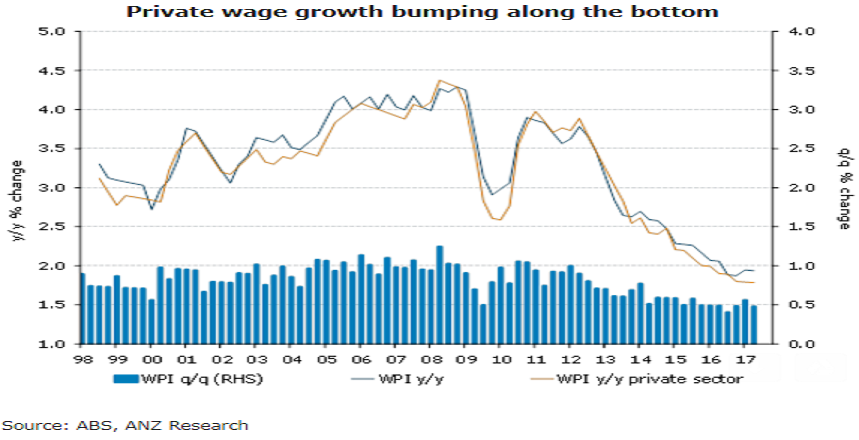Australia’s Wages rose in line with expectations in Q2, although private wage growth remains particularly weak, with no signs of a pick-up. The wage price index (WPI) rose by 0.5 percent q/q in Q2 and is up 1.9 percent over the year. While this was in line with market expectations, private wage growth decelerated from 0.5 percent q/q in Q1 to 0.4 percent q/q. Meanwhile, public sector wages rose by 0.6 percent, leaving the annual pace of public sector growth stable at 2.4 percent y/y.
Wage growth seems to have broadly stabilized across industries, with growth in the mining sector continuing to be the lowest, while public-sector-dominated industries, such as health and education, continue to enjoy the highest wage growth. Amongst the states, wage growth remains in a tight band between 1.9 percent and 2.1 percent, except for Western Australia, where wage growth is the lowest at 1.4 percent y/y.
Looking further out, however, any rise in wages is likely to be particularly gradual, with a number of factors continuing to weigh on wages including material spare capacity in the labour market, with measures of labour underutilisation still elevated; some further correction in Western Australian wages likely post the excesses of the mining boom; and ongoing elevated job insecurity and low productivity growth.
"While the stabilization in wages is encouraging, we expect any recovery to be gradual given ongoing spare capacity in the labor market, relatively high job insecurity, and low inflation expectations. On its own, the wages outlook suggests that the RBA remains on hold for some time," ANZ Research commented in its latest report.
Meanwhile, FxWirePro launches Absolute Return Managed Program. For more details, visit http://www.fxwirepro.com/invest



 Japanese Pharmaceutical Stocks Slide as TrumpRx.gov Launch Sparks Market Concerns
Japanese Pharmaceutical Stocks Slide as TrumpRx.gov Launch Sparks Market Concerns  Trump’s Inflation Claims Clash With Voters’ Cost-of-Living Reality
Trump’s Inflation Claims Clash With Voters’ Cost-of-Living Reality  Bank of Japan Signals Readiness for Near-Term Rate Hike as Inflation Nears Target
Bank of Japan Signals Readiness for Near-Term Rate Hike as Inflation Nears Target  Thailand Inflation Remains Negative for 10th Straight Month in January
Thailand Inflation Remains Negative for 10th Straight Month in January  Gold Prices Slide Below $5,000 as Strong Dollar and Central Bank Outlook Weigh on Metals
Gold Prices Slide Below $5,000 as Strong Dollar and Central Bank Outlook Weigh on Metals  Global Markets Slide as AI, Crypto, and Precious Metals Face Heightened Volatility
Global Markets Slide as AI, Crypto, and Precious Metals Face Heightened Volatility  Asian Stocks Slip as Tech Rout Deepens, Japan Steadies Ahead of Election
Asian Stocks Slip as Tech Rout Deepens, Japan Steadies Ahead of Election  Best Gold Stocks to Buy Now: AABB, GOLD, GDX
Best Gold Stocks to Buy Now: AABB, GOLD, GDX  Singapore Budget 2026 Set for Fiscal Prudence as Growth Remains Resilient
Singapore Budget 2026 Set for Fiscal Prudence as Growth Remains Resilient 































